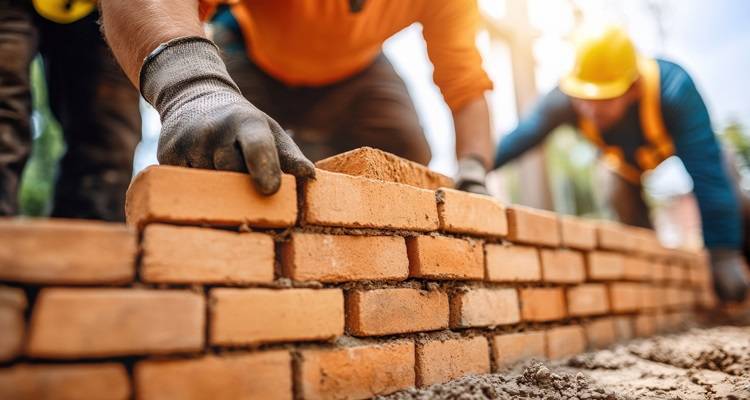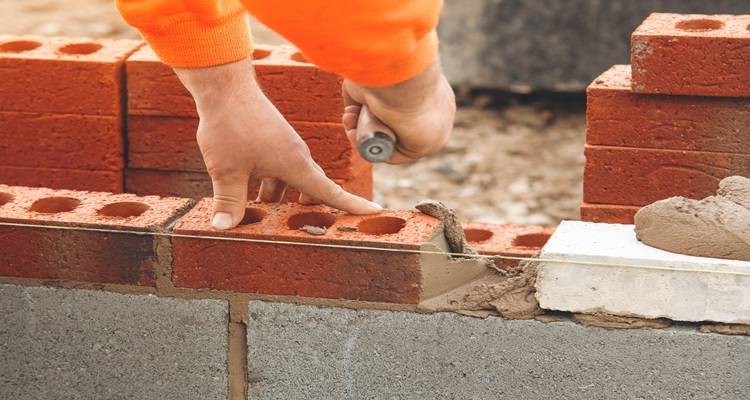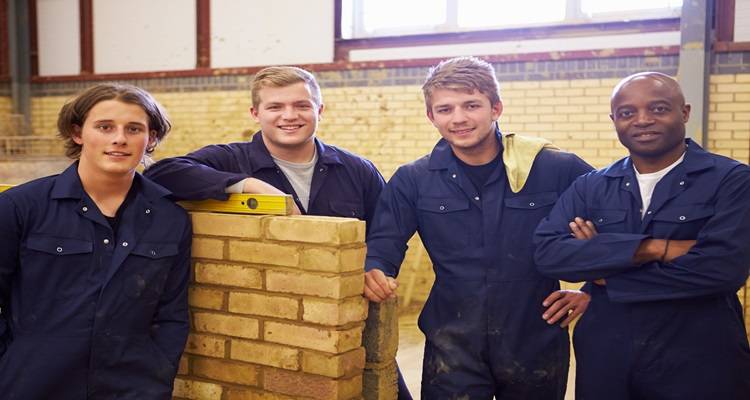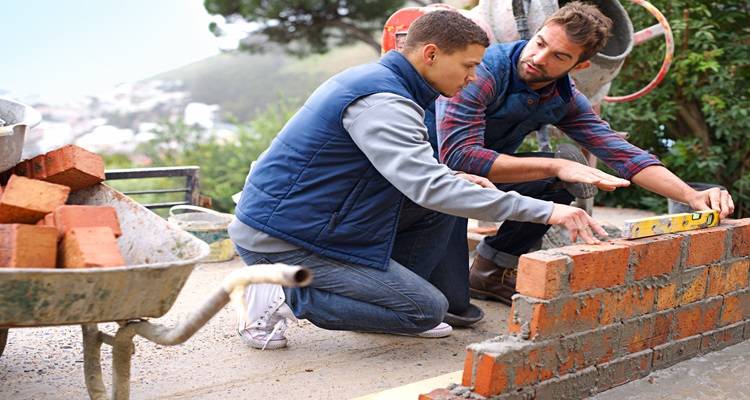How to Become a Bricklayer
Bricklayers make up part of an essential workforce. Capable of building houses, fixing chimneys and repairing walls, bricklaying is an evergreen trade with an unending demand–which is why it’s no surprise that from 2023 to 2024, there was an 81% year-on-year increase in searches for “bricklayers near me”.

The National Housebuilding Council has reported that the bricklaying workforce needs to almost double to meet the government’s house-building target of 300,000 new homes per year, with an additional 33,000 bricklayers needed in the UK.
If you’ve found yourself asking how to become a bricklayer, this article will help to point you in the right direction when it comes to essential training, qualifications, courses, salary information and career progression. Whether you’re brand new to the industry or are already working as a labourer and want to see if bricklaying is a good choice for you, we’ll aim to answer your questions.
Let’s get into it.
Table of Contents
What Does A Bricklayer Do?
Bricklaying can be a great career choice if you’re not afraid of getting your hands dirty. With an incredibly lucrative potential income, it’s clear why so many people choose it as their profession.

First, here’s an overview of the manual daily jobs a bricklayer might encounter, according to Gov.uk:
- Mix mortar, either by hand or using a mechanical mixer
- Use a trowel to lay bricks and mortar
- Shape and trim bricks using hammers, chisels and power tools
- Check rows are straight using a spirit level
- Build ornamental brickwork where required
There will also be a great deal of paperwork to read and follow as a bricklayer, including:
- Reading, assessing and following building plans for each project
- Measuring work areas to ensure accuracy, according to the plans
- Ensure all jobs are abiding by building regulations
Bricklaying is an enriching career as you can see your work's progress and impact in a given area, leading to higher levels of job satisfaction.
Are Bricklayers In Demand In The UK?
To put it plainly–yes–bricklayers are in demand in the UK. With the government’s pledge to create 300,000 extra new homes annually, a shortfall of 33,000 bricklayers must be filled to meet this target.
With the rise of environmentally friendly approaches, bricklaying is set to be a trade that won’t go out of style soon. Bricks are considered one of the most eco-friendly construction materials in the UK, a great sign of the trade's longevity.

What’s more, the brick creation process has recently been changed to be more environmentally conscious, helping the UK meet the 2050 Net Zero goal. Keith Aldis, CEO of the Brick Development Association (BDA), details how the BDA is committed to “reduce waste and increase sustainability” within the industry, encouraging local domestic supply chains and factory upgrades to reduce carbon footprints during manufacturing processes.
Average Bricklayer Salary
So, how much do bricklayers make? Here’s a quick overview of average bricklayer salaries for different seniority levels in the UK:
| Bricklayer Seniority/Position | Income Per Hour | Income Per Day | Income Per Year |
|---|---|---|---|
| Apprentice bricklayer | £6 | £50 | £11,000 |
| Newly-qualified bricklayer | £18 | £145 | £32,000 |
| Experienced bricklayer | £19 | £155 | £40,000 |
| Self-employed sole trader | £38 | £300 | £56,000 |
| Limited company business owner | £40 | £320 | £60,000 |
All figures are estimates, pre-tax.
Newly qualified bricklayers can earn around £32,000 per year (pre-tax), making it one of the highest-paying trades in the UK, second to being an electrician. Once you have more experience in the industry and have been working for 1 to 5 years, this salary can rise to £40,000 (pre-tax).

If becoming self-employed is your goal, training as a bricklayer can have lucrative benefits. As a self-employed sole trader, your income can be in the region of £56,000 (pre-tax), while limited company business owners can reach £60,000 (pre-tax).
It’s worth bearing in mind that these salaries will be impacted by business expenses that you won’t necessarily be subject to as an employee, such as vehicle costs, fuel, and material charges, which will bring down the total take-home amount.
These include:
- Vehicle costs
- Fuel costs
- Materials and supply costs
- Tools and maintenance/upkeep of tools
- Insurance
For a self-employed bricklayer, you can expect added fees of around £7,000 per year to deduct from your gross income, and business owners of limited companies can expect around £10,000.
Let’s compare this salary to the National Living Wage and National Minimum Wage as updated in April 2024:
| 21 and over | 18 to 20 | Under 18 | Apprentice |
|---|---|---|---|
| £11.44 | £8.60 | £6.40 | £6.40 |
Correct as of April 2024, Gov.uk
Apprentice bricklayers can earn around £6 per hour, just shy of the £6.40 national minimum wage. Moving up the ranks as a newly-qualified bricklayer, however, the hourly income rises to £18–which is more than the national minimum wage for under 18s (£6.40), 18 to 20-year-olds (£8.60), and the national living wage for 21 and overs (£11.44).
Bricklayer Career Requirements
There are several routes into the bricklaying trade. These can include:
- College courses
- Apprenticeships
- Working/training on the job
In terms of education, Gov.uk suggests the following routes to enter into bricklaying:
College courses
- Level 1 Certificate in Construction Skills - suitable for 14-19 year-olds or individuals of any age wanting to enter the profession, and no previous experience is required.
- Level 2 Diploma in Bricklaying - practical and theory-based assessments, ideal for individuals with a basic understanding of construction and bricklaying specifically.
- Level 2 and 3 Diploma in Trowel Occupations - Level 2 is suitable for those aged 16 and over with basic knowledge and skills in trowel use. Level 3 is ideal for those with experience in the construction industry who want to expand their knowledge to move into a supervisory role.
- T-Levels On-Site Construction - a two-year course with on-site placements to teach general construction health and safety, building design and planning, construction methods and regulations/standards.
Looking at apprenticeships next, you can consider the following:

Apprenticeships
- Bricklaying Level 2 Intermediate Apprenticeship - over two years, individuals can learn about health and safety, PPE, environmental and sustainability considerations, and practical hands-on bricklaying.
- Craft Bricklaying Level 3 Advanced Apprenticeship - over 18 months, individuals can set out and lay bricks to train and become a craft bricklayer, foreman bricklayer, or senior bricklayer.
In addition to these educational options, trainee bricklayers can learn on the job. To work on a construction site legally, the trainee will need a Construction Skills Certification Scheme (CSCS) card.
It is also worth noting that a criminal record check will be carried out before any training or work begins to ensure you have a clean record. Your driving licence will also be required, and you’ll have to prove physical competency to keep up with the manual demands of the job.
Soft skills–general traits not specific to any particular job–can also be helpful when training to be a bricklayer. These include:
- Basic computer skills for training purposes
- Basic customer service skills for dealing with customers
- Good time management skills to arrive on-site at the right time
- Teamworking capabilities to work with your team
- Problem-solving attitude to tackle issues as and when they arise during projects
- Good work ethic and attention to detail
How Long Does It Take To Become A Bricklayer?
Depending on your chosen pathway, the time to become a bricklayer in the UK can differ. Here are the main routes into the industry:
- College courses (Level 1 Certificate in Construction Skills, Level 2 Diploma in Bricklaying, Level 2 and 3 Diploma in Trowel Occupations, T Level in On-Site Construction)
- Apprenticeships (Bricklaying Level 2 Intermediate Apprenticeship, Craft Bricklaying Level 3 Advanced Apprenticeship)
- Learning on the job (you’ll need a Construction Skills Certification Scheme (CSCS) card to work legally on a construction site)
The T Level in On-Site Construction is a two-year programme awarding a level 3 qualification upon completion. This specific course includes nine weeks on-site in an industry placement, which provides essential practical experience.
This course is a great all-rounder for several trades, giving early experience in bricklaying, carpentry, plastering, painting and decorating, and shop fitting. However, to get the most out of your course, you must choose your specialism before you start.

The Bricklaying Level 2 Intermediate Apprenticeship lasts two years, during which individuals can learn about health and safety, PPE, environmental and sustainability considerations, and practical hands-on bricklaying. This has a maximum of £13,000 in government funding available.
The Craft Bricklaying Level 3 Advanced Apprenticeship lasts 18 months and can be funded up to £10,000 by the government. During this apprenticeship, individuals can set out and lay bricks to train and become craft bricklayers, foreman bricklayers, or senior bricklayers.
Bricklayer Qualifications
There are several ways to enter the bricklaying industry, so courses and apprenticeships have different qualifications and entry requirements. Gov.uk says the main requirements for college courses are:
- 4 or 5 GCSEs at grades 9 to 4 (A* to C), or equivalent, including English and maths for a T Level

Apprenticeships have slightly different requirements. Gov.uk recommends:
- Some GCSEs, usually including English and maths, or equivalent, for an intermediate apprenticeship
- 5 GCSEs at grades 9 to 4 (A* to C), or equivalent, including English and maths, for an advanced apprenticeship
A Construction Skills Certification Scheme (CSCS) card is essential to work legally on a construction site. This is especially important if you’re training under an established bricklayer and not going down a conventional college or apprenticeship training route.
Bricklayer Career Progression
With higher salaries falling in step with going higher up in the bricklaying profession, a typical move for established bricklayers is to move into the self-employed or business owner territories to unlock higher incomes. That said, additional fees will be covered once you’re solely responsible for a business, including business expenses and other operational costs.

If you want to move away from traditional bricklaying and wish to specialise in a related sector, you could consider the following:
- Custom brickwork/masonry - custom brickwork creations can appeal to businesses and individuals wanting a bespoke finish to their premises. This can be in the bricks used to build or how they’ve been laid out in murals or other artistic ways.
- Eco-friendly bricklaying/construction - bricks are considered eco-friendly, so if you want to boost your earning potential and appeal to eco-friendly customers, you can highlight this merit to further your income.
- Heritage restoration/heritage masonry - this type of brickwork has a focus on historical properties that have either fallen into disrepair or need routine maintenance. It will involve working with different types of bricks and different laying methods, requiring a deeper understanding of the construction and restoration process to be completed successfully.
What is important to note is that the further you move away from “traditional” bricklaying and housebuilding, the demand for your exact specialism might not be the same as it may be for standard bricklaying. While there is a government push to build 300,000 new homes a year, there might not be a like-for-like push on heritage restoration, for instance, so you may risk pigeonholing yourself into a niche if you haven’t thoroughly researched the demand for it.
Retraining As A Bricklayer
It can be easy to get overwhelmed thinking you’ve missed the boat on training as a bricklayer if you haven’t started learning as a teenager–but it’s not true. The main pull for the younger generations into manual trades is the minimal qualification requirements, leaving the industry open for them in ways that other industries might not be–but this open door isn’t just for teenagers.
You Can Become a Bricklayer At Any Age
Adults of any age can choose to retrain as a bricklayer, even if they have no prior qualifications. There will be some degree of manual capability to becoming a bricklayer, but as long as you are physically able and capable of doing the job, there is no reason you can’t enter the industry at a later age than some.
Minimal Qualifications Are Required
As mentioned, there are minimal qualifications needed to become a bricklayer, and most can be learnt on the job or with a short course. What can be transferable, however, are soft skills picked up in other jobs. If you already have a T Level in Construction, this can also demonstrate an understanding of the industry.

Government Funding Is Available
It’s easy to get hung up thinking finance is only available for “students”–with the word synonymous with youth–but this isn’t the case. Between £10,000 and £13,000 can be available through government funding to help with course fees, so take advantage of these schemes to ease your training.
Already Have On-Site Experience?
You may want to switch to bricklaying after working for years in adjacent trades such as plumbing, plastering, painting and decorating, and other similar labour-intensive trades. This background will help you understand what goes on in a building site, how things happen, and in what order, giving you essential prior knowledge to enter your new career with confidence.
Summary
No matter the time, bricklayers will always be needed in the UK. While there will be year-to-year variations in exact salary, demand and availability of projects, you can be safe in the knowledge that bricklaying is an evergreen industry and a secure career to invest your time and efforts into if you want to carve out a career in the construction industry.
- Bricklaying salaries are highly competitive, with newly qualified bricklayers earning up to £32,000 per year (pre-tax).
- Location, experience level, specialisms, and employment status (employee vs. self-employed) will impact exact earnings.
- There will always be a demand for bricklayers, with online searches for “bricklayers near me” rising 82% (2023 to 2024).
- Bricklaying associations are advocating environmentally friendly approaches to bricklaying, from manufacture to assembly, which is helping to promote 2050’s Net Zero initiative.
- The UK is currently experiencing a bricklaying shortfall, and it needs an extra 33,000 bricklayers to meet the government's new home targets.
Bricklaying can be a great choice if you want a hands-on career where you can see the impact your work is having, which can give you excellent job satisfaction.
Next Steps
Whether you are fresh to the bricklaying industry or are retraining from another manual trade, bricklaying can be a lucrative and personally rewarding career. If you want to set up your own business as a self-employed bricklayer, check out Gov.uk for their pathway to becoming self-employed.
For more information about becoming a bricklayer, visit Go Construct and House Building Careers.
FAQs
What’s the Average Income for a Bricklayer in the UK?
Incomes rise when you become self-employed or a limited business owner, with incomes of £56,000 and £60,000 (pre-tax), respectively. However, business running costs, such as vehicle costs, fuel, and material charges, will impact these salaries, bringing down total take-home amounts.
How Does a Bricklayer’s Salary Compare to Other Trades?
Compared to other manual trades, bricklayers earn more per hour (£12.83) than joiners (£11.75 per hour), construction labourers (£8.05 per hour) and carpenters (£11.97).
How Do I Get Practical Bricklaying Experience?
Do I Need Specific Qualifications or Certifications to Become a Bricklayer?
The courses range from college courses and apprenticeships in:
- Level 1 Certificate in Construction Skills
- Level 2 Diploma in Bricklaying
- Level 2 and 3 Diploma in Trowel Occupations
- T Level in On-Site Construction
- Bricklaying Level 2 Intermediate Apprenticeship
- Craft Bricklaying Level 3 Advanced Apprenticeship
How Do I Start My Own Bricklaying Business in the UK?
Remember that for most self-employed bricklayers, you’ll need to deduct around £7,000 per year from your gross income to account for business expenses. In comparison, business owners of limited companies can expect to deduct around £10,000.
Sources
https://nationalcareers.service.gov.uk/job-profiles/bricklayer
https://www.bbc.co.uk/news/articles/c51n984eewgo
https://www.gov.uk/national-minimum-wage-rates








